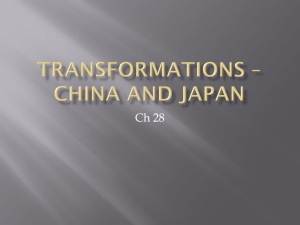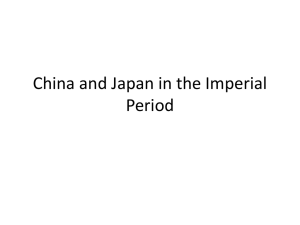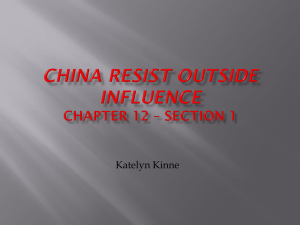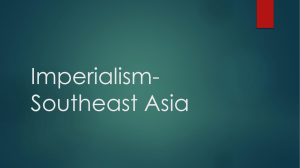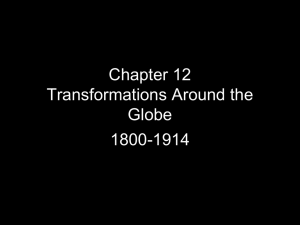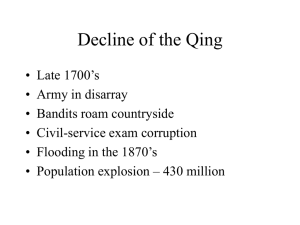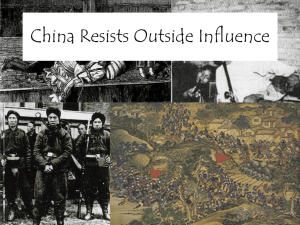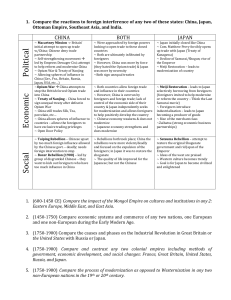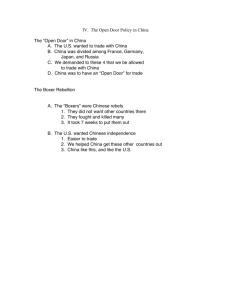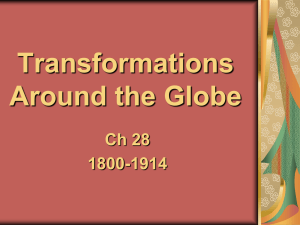Imperialism in China & Japan: Case Studies
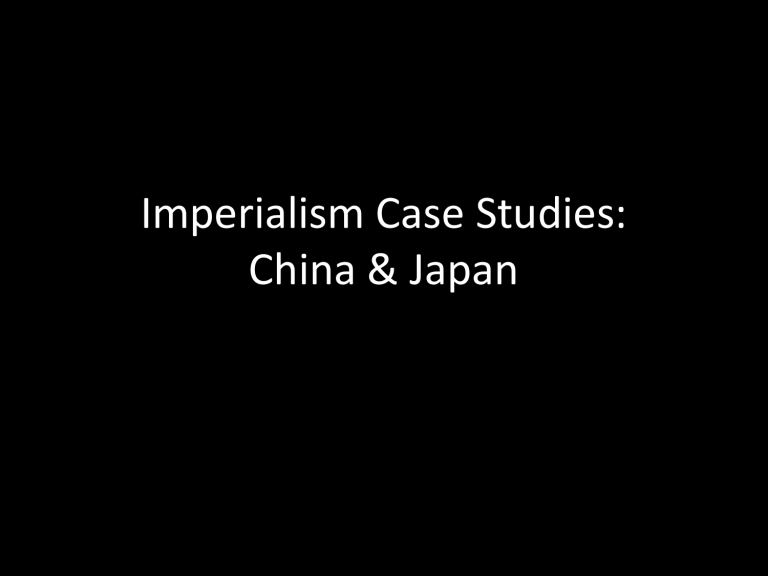
Imperialism Case Studies:
China & Japan
China: Key Terms & Questions
Terms
1.
Opium/Opium War
2.
Extraterritorial Rights
3. Taiping Rebellion
4. Sphere of influence
5. Open Door policy
6. Boxer Rebellion
Questions:
1.
Why did China have little interest in trading with the West?
2.
What internal problems did China face?
3.
Why did reform efforts fail?
4.
Why did Europeans establish spheres of influence rather than colonies?
China: Spheres of Influence, c. 1910
China and the West
• China was largely self-sufficient and could reject
Western offers
• Healthy agricultural economy, large mining & manufacturing industries
• Looked down on all foreigners
• Only allowed foreigners to do business in Guangzhou
(gwahng-joh) – balance of trade in Chinese favor
• Opium – a product that would upset this balance
(addictive drug derived from poppy plant)
• By 1835 – 12 million Chinese people were addicted
The Opium Wars
• Qing Emperor was angry about this situation; pleaded with the British to stop the trade
• Opium War broke out
– China’s ships were no match for the British
– China signed the Treaty of Nanjing
• Gave GB island of Hong Kong
• US and other foreigners gained extraterritorial rights
(not subject to Chinese law)
Internal Problems in China
• 1. Foreigners
• 2. Growing population (430 million in 1850)
– Food production could not keep up, widespread hunger
• 3. Rebellion against Qing Dynasty
– Taiping Rebellion: The Chinese word “Taiping” means “great peace”; Hong Xiuquan (hung shee-oo-choo-ahn) organized a peasant army of almost a million in hopes to create a
“Heavenly Kingdom of Great Peace”. He and his followers captured large areas of southern China and Nanjing. His new government was brought down ten years later through internal fighting and outside assaults (20 million died in the rebellion)
Growing Foreign Influence
• Question: to reform based on Western ways or continue traditional ways
• Dowager Empress Cixi was in charge
– She was traditional, but supported certain reforms
– “Self-strengthening movement”: update educational system and military (manufacture steam-powered gunboats, rifles, and ammo)
• Foreigners took advantage of China’s situation
– Created spheres of influence
– US feared other countries would divide China and create separate colonies
• Proposed the “Open Door Policy” – China’s “doors” should be open to all merchants
• Others agreed with this out of fear too
Chinese Nationalism
• Frustration continued to grow: modernize or remain traditional
• Boxer Rebellion
– Peasants and workers resented special privileges for foreigners and Chinese Christians
– Formed a secret society (Society of Righteous and Harmonious
Fists – aka: Boxers)
– Their campaign against Dowager Empress and foreigner privilege was known as the Boxer Rebellion
– Laid siege to Beijing in 1900 and surrounded European section
– They were defeated by a multinational force
– Despite the rebellion’s failure, nationalism grew
Japan: Key Terms and Questions
Terms:
1. Treaty of Kanagawa
2. Meiji Era
3. Russo-Japanese War
Questions:
1. How was the situation in Japan similar to, yet different from China?
2. How did Japan modernize? Why?
3. Is Japan’s imperialism justified?
Japan: No Longer Isolated
• Japan stayed isolated from in the industrialized world (traded with China and Indonesia)
• In the early 19 th c e., Westerners tried to persuade Japan to open their ports
• Like China, Japan refused to accept them at first
• 1853: US sent Commodore Matthew Perry to Tokyo (showed off their ships and cannons) who asked Japan to open free trade to the US (actually a threat)
– Treaty of Kanagawa (1854): Japan opened 2 ports to the
US; other Western powers pushed for other ports to open; offered extraterritorial rights to those other countries
Reform and Modernization
• People questioned whether or not to reform and modernize
• Meiji Era (or “enlightened” era): Mutsuhito was a young emperor who ruled for 45 years
– Thought the best way to compete with western influence was to modernize (Can’t beat ‘em – join them)
– Imitated aspects of different western countries
– Reformed education and the military
– Industrialized
– Became competitive with the West
Japan Becomes an Imperial Power
• Japan became strongest military power in Asia because of its modernization
• Got rid of extraterritorial rights
• Strong nationalism
• 1876 – forced Korea to open 3 ports (this upset China who saw Korea as a trading partner)
– China & Japan agreed to not send armies to Korea but
China broke the agreement in 1894 (helping Korea)
– Japan and China went to war; Japan won and gained its first colonies (Taiwan)
– Japan’s victory changed balance of power
Imperialism Cont’d
• Japan and Russia competed in Asia
• They went to war over Manchuria
– Japan would recognize Russia’s rights in Manchuria if
Russia promised to stay out of Korea (Russia said no)
• Feb. 1904 – Japan launched a surprise attack on Russian ships off of Manchuria
• Russo-Japanese War: Japan drove Russian troops out of Korea and captured Russia’s pacific fleet
– Huge embarrassment for Russia!!
• 1905 – Japan made Korea a protectorate; 1910- annexed it
Hi everyone!
I apologize for the wordiness of the PowerPoint. I tried to make it fairly self-explanatory but we will go over the major terms and essential questions in class.
Please be prepared to discuss them and ask any questions that you have.
